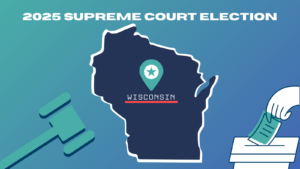2025 States to Watch: Wisconsin

Wisconsin Supreme Court Election
Wisconsin’s supreme court justices are elected in nonpartisan elections. Wisconsin is the only state in the country holding judicial elections in both odd and even numbered years. The term of one Wisconsin Supreme Court justice will expire on July 31, 2025. Associate Justice Ann Walsh Bradley joined the Wisconsin Supreme Court in 1995 and was reelected in 2005 and 2015. In April of 2024, Bradley announced she would retire from the court upon the expiration of her third term. An election to replace Bradley will be held on April 1, 2025. You can view your sample ballot here.
Who’s running for the Wisconsin Supreme Court in 2025?
Following the filing deadline on January 7, 2025, two candidates had announced they would run to replace Bradley: Waukesha County Circuit Court Judge Brad Schimel, a Republican former Wisconsin Attorney General, and Dane County Circuit Court judge Susan Crawford, a former assistant attorney general and counsel to former Wisconsin Gov. James Doyle (D). The primary election, originally scheduled for February 18, was cancelled.
The Stakes
As the state’s court of last resort, the Wisconsin Supreme Court holds the power to make final, precedent-setting decisions about the issues it hears. In recent years, the court has issued important rulings that have impacted election integrity and voting rights, criminal justice, executive authority and civil liberties, public health, tenant rights, and workers’ rights.
The court has issued several important rulings that have affected voting rights and the administration of Wisconsin’s elections in recent years. In a 4-3 ruling in late 2020, the court rejected former President Donald Trump’s efforts to invalidate 200,000 votes cast in Dane and Milwaukee Counties. The ruling upheld President Joe Biden’s victory in Wisconsin in the 2020 election. In late 2023, the court issued a decision ordering the state legislature to draw new apportionment maps for its state Assembly and Senate districts, finding the maps must be redrawn because some of the districts in the current maps are non-contiguous in violation of the state constitution. The 4-3 ruling required candidates for all of the state’s Assembly seats and half of its Senate seats to run in new districts in 2024. The court later declined a motion, filed by lawmakers who sought to preserve their hold on power, that asked the court to reconsider the decision that had ordered new maps to be drawn. The court also overturned its previous decision that had prohibited the use of ballot drop boxes, reinstating the ability of election clerks to use drop boxes across the state in the November 2024 elections. The previous ruling had interpreted state law to require that ballot drop boxes be staffed and had required local clerks to close drop boxes shortly before the 2022 election. And earlier this year, the court blocked an effort by lawmakers to remove the state’s top elections official from her post.
The court has also made important decisions that have impacted criminal justice in Wisconsin. In 2022, the court allowed a criminal defendant charged with the first-degree intentional homicide of the man who allegedly trafficked her to invoke an immunity defense offered to victims of sex trafficking under state law. But the following year, the court rejected a challenge to a constitutional amendment expanding the rights of crime victims. The amendment was unsuccessfully challenged by advocates for the rights of the accused on grounds that voters were not informed that the proposed amendment would decrease the rights of people accused of criminal activity while expanding crime victims’ rights. Voters had approved the proposal in April of 2020.
The court has also made important decisions impacting executive authority and civil liberties in Wisconsin. In 2013, the court ruled that police did not violate a man’s privacy by installing a GPS tracker in his car without his knowledge, with the petitioner arguing that evidence collected as a result of the tracker’s use should be suppressed because it was not included in the warrant. In 2015, the court ordered a halt to the John Doe II investigation into whether Gov. Scott Walker’s 2012 campaign against efforts to recall him coordinated illegally with conservative interest groups. The court called the special prosecutor’s handling of the case unconstitutional and ordered that all potential evidence be returned and all copies be destroyed. The court clarified and reaffirmed its decision later that same year, ordering the special prosecutor to discontinue any further involvement in the probe. The court vacated a 2019 order by a lower court that issued a temporary injunction halting all legislation and appointments approved during an extraordinary legislative session after an interest group sued the governor on the grounds that the extraordinary session was unconstitutional. The decision by the supreme court ordered the lower court to dismiss the suit and restored all appointments and legislation approved during the legislative session. And in 2022, the court rejected an effort by the state’s attorney general to force an appointee to the state’s Natural Resources Board to vacate his position after the expiration of his term. The court’s decision allowed the appointee to remain on the board for nearly two years after his term had expired.
The court has issued recent decisions that have shaped public policy in Wisconsin in the wake of the 2020 coronavirus pandemic. Two months into the pandemic, the Supreme Court struck down Governor Tony Evers’ stay-at-home order that closed businesses and schools in an effort to limit spread of the virus. Two years after delivering its decision to remove authority from the governor to issue public health orders, the court awarded authority to issue public health orders to local health departments without oversight from elected officials. And in 2023, the court voted in a public administrative conference to reduce the time when most eviction records must be kept on the state court website from 20 years to two years. The change was sought in cases where there is no money judgment against a tenant and was intended to help renters with eviction histories access housing.
Finally, the court has had a long history of issuing rulings that have impacted the rights of workers in Wisconsin. In 2011, the court overturned an order from a Dane County judge that threw out Act 10, a new law that gutted the rights of public employees in Wisconsin to bargain collectively on issues affecting wages, hours, and working conditions. The court’s order reinstated Act 10. The court again upheld Act 10 in 2014 after a challenge brought by teachers and other public employees of the city of Milwaukee. The court is set to hear yet another challenge to Act 10 this year. And late last year, the court upheld a decision by a lower court that required Amazon to classify some of its delivery drivers as employees as directed by the state’s Labor and Industry Review Commission, rather than as independent contractors as contended by the company. The ruling will require Amazon to comply with state laws regarding minimum wage, unemployment insurance, workers’ compensation, and overtime protections by paying into the state’s unemployment insurance and workers’ compensation schemes, pay overtime to eligible employees, and remit payroll taxes to the state on behalf of the employees.
Wisconsin’s highest court has issued decisions in recent years that have significantly impacted the health, safety, and prosperity of Wisconsin residents. The justices who sit on this court play an important role in ensuring that every Wisconsinite has access to justice in the state’s legal system.
How You Can Get Involved
Wisconsin’s supreme court election will be held on Tuesday, April 1, 2025. Polls are open from 7:00 am to 8:00 pm.
Make sure you’re registered to vote! Check your registration status here.
- The deadline to register to vote by mail or online is Wednesday, March 12, 2025.
- Voters can register to vote in-person at their municipal clerk’s office during the clerk’s business hours until 5:00 p.m. on Friday, March 28, 2025. Find your municipal clerk’s contact information here.
- Voters can register to vote at their polling place from 7:00 am to 8:00 pm on Election Day, Tuesday, April 1, 2025.
If you’re unable to go to the polls or want to vote by mail, you can find more information on absentee voting here.
- The deadline for municipal clerks to send absentee ballots to voters with active requests already on file is Tuesday, March 11, 2025. Requests received after March 11, 2025 must be fulfilled within 2 business days.
- Municipal clerks must receive absentee ballot requests no later than 5:00 pm on Thursday, March 27, 2025.
You can also vote early in-person at your municipal clerk’s office. Check your polling place or find your municipal clerk’s office here.
- Early voting begins Tuesday, March 18, 2025, and is available through Sunday, March 30, 2025. Hours and availability vary by municipality. Some municipal offices may not offer additional in-person absentee hours. Please contact your municipal clerk for absentee voting hours.
Make sure to vote your entire ballot, including the judicial races in the nonpartisan section of the ballot!

